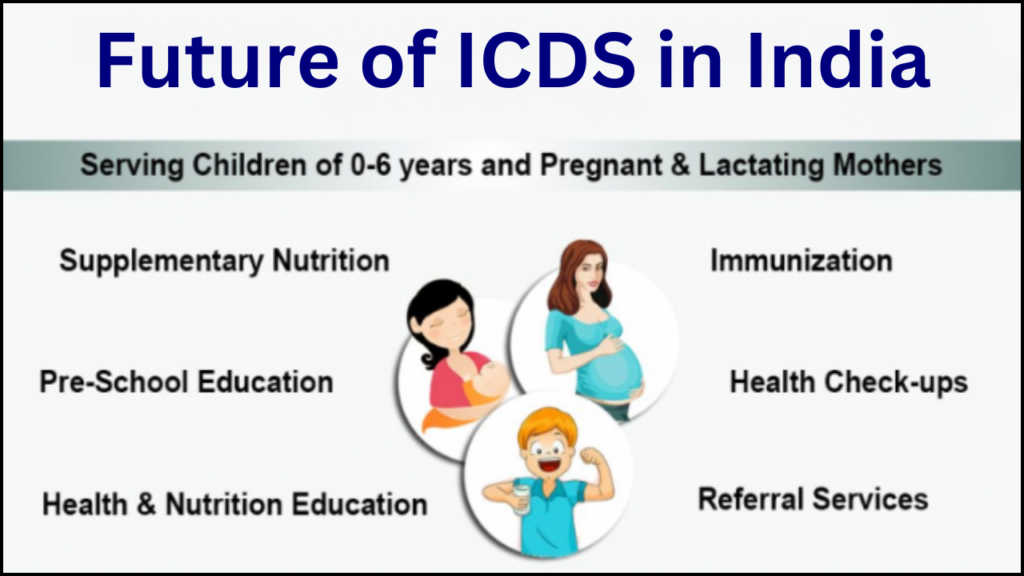
Integrated Child Development Services is one of the most significant welfare programs in India. The program aimed at improving the health, nutrition, and development of children under the age of 06, as well as pregnant and lactating mothers. Since its launch in 1975, ICDS has played a crucial role in addressing malnutrition, immunization, and early childhood education. However, despite its impact, there are still many areas where improvement is needed to ensure a healthier and brighter future for India’s children.
Current Status of ICDS in India
The ICDS program operates through a network of Anganwadi centers across the country. These centers provide essential services, including:
- Supplementary nutrition
- Immunization
- Health check-ups
- Referral services
- Pre-school education
- Nutrition and health education
With millions of beneficiaries, ICDS has significantly contributed to reducing child mortality, improving maternal health, and enhancing early childhood development. However, several challenges hinder its effectiveness.
Challenges Facing ICDS
- Malnutrition and Stunting: Despite various efforts, India still struggles with high levels of malnutrition and stunting among children. Many children do not receive adequate nutrition due to poor implementation and lack of awareness.
- Infrastructure Gaps: Many Anganwadi centers lack proper infrastructure, including hygienic cooking facilities, storage, and safe spaces for children. Some centers operate from rented buildings or in inadequate spaces.
- Shortage of Skilled Workforce: Anganwadi workers and helpers play a crucial role in implementing ICDS, yet they often receive inadequate training and low salaries. This affects service delivery quality.
- Lack of Monitoring and Accountability: Many centers function without regular monitoring, leading to inefficiencies, misuse of resources, and poor service quality.
- Limited Community Participation: For ICDS to be truly effective, greater involvement of the community is required. However, many parents, especially in rural areas, are unaware of the full benefits of ICDS services.
What More Needs to Be Done?
To make ICDS more effective and impactful, the following steps need to be taken:
- Strengthening Nutrition Programs: The government should focus on improving the quality and variety of food provided through ICDS. Locally available nutritious food items should be encouraged to enhance the program’s effectiveness.
- Improving Infrastructure: More investment is required to build better Anganwadi centers with safe and hygienic facilities. This includes proper kitchens, toilets, and storage spaces for food items.
- Better Training for Anganwadi Workers: Regular training and skill enhancement programs should be conducted for Anganwadi workers and helpers. This will ensure they have the knowledge and expertise to provide high-quality services.
- Technology Integration: The use of digital tools can help in tracking beneficiaries, monitoring growth, and ensuring transparency in food distribution. Mobile apps and online dashboards can assist in better data collection and management.
- Community Awareness Programs: More awareness campaigns should be conducted to educate parents about the importance of nutrition, vaccination, and early childhood education. This can increase the participation of families in ICDS services.
- Enhancing Monitoring and Accountability: Regular inspections, audits, and third-party evaluations should be conducted to ensure that ICDS centers function effectively. Strict action should be taken against corruption and inefficiencies.
- Collaborations with NGOs and the Private Sector: Partnering with NGOs, private companies, and social enterprises can bring in additional resources, expertise, and innovations to improve service delivery.
- Focusing on Urban Poor and Migrant Children: While ICDS primarily serves rural areas, there is a growing need to expand its services to urban slums and migrant populations who lack access to basic nutrition and healthcare.
- Policy Reforms and Increased Budget Allocation: The government should increase funding for ICDS and introduce policy reforms that address the evolving nutritional and healthcare needs of children and mothers.
Key Takeaways
ICDS has been a game-changer in improving the health and well-being of children and mothers in India. However, there is still a long way to go in tackling malnutrition, strengthening infrastructure, and improving service delivery. By adopting modern technologies, increasing community involvement, and ensuring better training for workers, India can make ICDS more effective and impactful. With sustained efforts and policy reforms, the future of ICDS can be brighter, ensuring that every child gets a healthy start in life.